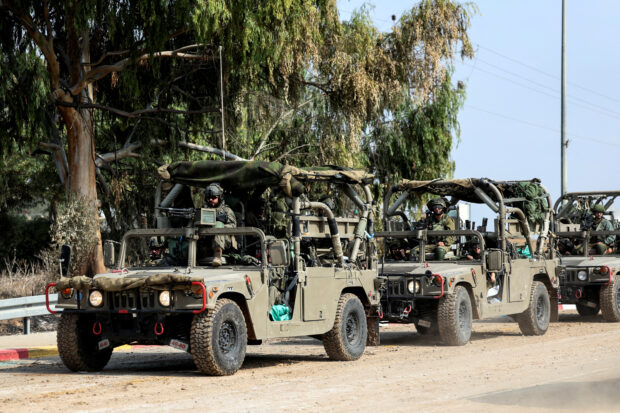UAE warns against risk of regional spillover from Gaza war

FILE PHOTO: Israeli soldiers drive in military vehicles by Israel’s border with Gaza in southern Israel, October 10, 2023. REUTERS/Ronen Zvulun/File Photo
ABU DHABI — The United Arab Emirates (UAE) warned Friday that there was a risk of a regional spillover from the Israel-Hamas war in Gaza, adding that it was working “relentlessly” to secure a humanitarian ceasefire.
The UAE was the most prominent Arab country to sign the 2020 Abraham Accords, a series of pacts with Israel, which the latter hoped would pave the way to normalization of ties with Muslim superpower Saudi Arabia, but the war dealt those plans a blow.
“As we continue working to stop this war we cannot ignore the wider context and the necessity to turn down the regional temperature that is approaching a boiling point,” Noura Al Kaabi, a minister of state at the ministry of foreign affairs, told a policy conference in the UAE’s capital, Abu Dhabi.
“The risk of regional spillover and further escalation is real, as well as the risk that extremist groups will take advantage of the situation to advance ideologies that will keep us locked in cycles of violence.”
A leading oil producer, the UAE views Islamist groups such as Hamas, which was tied to Egypt’s Muslim Brotherhood, as an existential threat to the Middle East.
Article continues after this advertisementREAD: What is Hamas? The group that rules Gaza Strip has fought several rounds of war with Israel
Article continues after this advertisementThe UAE supported Egypt’s current leader, Abdel Fattah al-Sisi, when he toppled President Mohamed Mursi of the Muslim Brotherhood in 2013.
“Every effort must be made to protect civilians and immediately put an end to this conflict,” Kaabi added.
Israel’s bombardment of the Gaza Strip in its war with Hamas has angered Arab states who are concerned about sharply rising civilian casualties and Israel’s blockade of the densely populated coastal enclave.
The UAE has said it planned to treat 1,000 Palestinian children from Gaza, but did not clarify how they would leave the besieged enclave.
READ: A picture and its story: Grief in Gaza and the loss of a child
The latest war in the decades-old Israeli-Palestinian conflict began when Hamas militants broke through the border on October 7 and went on a rampage.
Israel says Hamas killed 1,400 people, mostly civilians, and took more than 200 hostages. Israel’s ensuing bombardment of the small densely populated Palestinian enclave of 2.3 million people has killed at least 9,601 people, including 3,760 children, according to Gaza health authorities.
“We are working relentlessly to reach an immediate and full humanitarian ceasefire so life-saving aid could be delivered to Gaza Strip,” Al Kaabi said.
READ: How a secretive Hamas commander masterminded the attack on Israel
She also called for the protection of civilians and said that this conflict was a result of “decades of long failure” to find a resolution to the Israeli-Palestinian conflict.
The UAE’s neighbour Bahrain, also a signatory to the Abraham Accords, said on Thursday its ambassador to Israel had returned home and that the Israeli ambassador in Manama had left the kingdom “a while ago”.
The government statement did not clarify whether that meant the Israeli ambassador had been expelled. The Israeli foreign ministry maintains that relations with Bahrain, the Gulf state that is home to the U.S. Fifth Fleet, are stable.